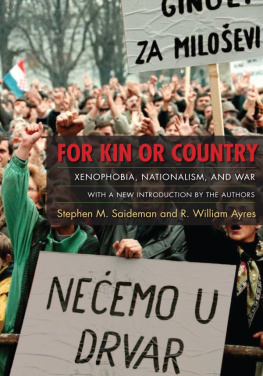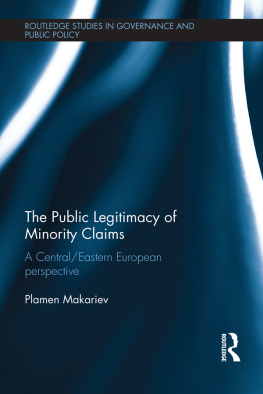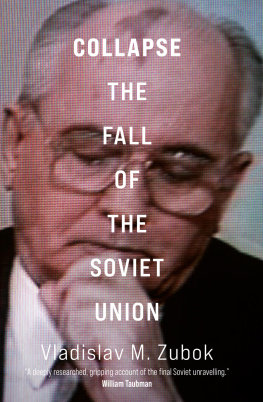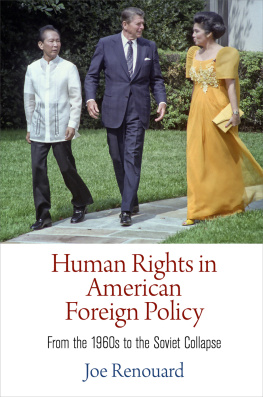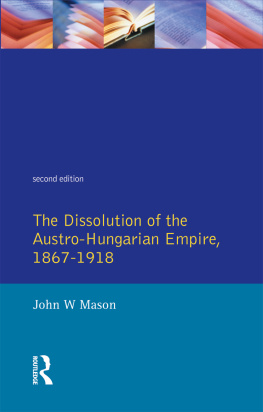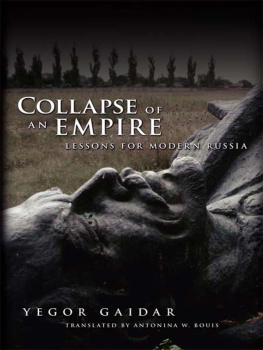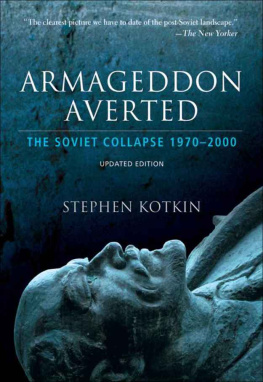COLUMBIA UNIVERSITY PRESS
Publishers Since 1893
NEW YORK CHICHESTER, WEST SUSSEX
cup.columbia.edu
Copyright 2008, 2015 Columbia University Press
All rights reserved
E-ISBN 978-0-231-51449-1
ISBN 978-0-231-14478-0 (cloth: alk. paper)ISBN 978-0-231-14479-7 (pbk.: alk. paper)ISBN 978-0-231-51449-1 (e-book)
Library of Congress Control Number : 2015944289
A Columbia University Press E-book.
CUP would be pleased to hear about your reading experience with this e-book at .
Cover design: Milenda Nan Ok Lee
Cover image: Anja Niedringhaus / AFP / Getty Images
References to websites (URLs) were accurate at the time of writing. Neither the author nor Columbia University Press is responsible for URLs that may have expired or changed since the manuscript was prepared.
T HIS PROJECT DEVELOPED OVER THE COURSE OF more than a few years, so the debts are many. First, we are very grateful to the Council on Foreign Relations for the International Affairs Fellowship, and in particular to Elise Carlson Lewis, Aoki Lane, and Allison Valencia. The fellowship provided funding for the first trip to Hungary and part of the second. More important, the fellowship put one of the authors (Saideman) on the U.S. Joint Staff in the Directorate of Strategic Planning and Policy (J-5), working on issues relating to Bosnia, Kosovo, and other parts of the former Yugoslavia. This experience had a significant impact on this project by providing contacts in Hungary and by shaping how we think about policy, the foreign policymaking process, the Balkans, and irredentism. While we would like to thank all of the officers who served in the European division of J-5, several stand out. Pat Anonietti, Harold Buchholz, and Brad Mitchell provided much information, including the first contacts, and Brad even provided housing for the first trip to Budapest. The members of the Central and Eastern European Division not only welcomed the strange academic in their midstincluding nicknaming him The Irredentistbut also engaged in a series of conversations about a variety of topics, including the enlargement process, the dynamics of irredentism, and the potentially destructive consequences of domestic politics. Jim Church, Jim Ransom, Ray Hodgkins, Chris Cook, Tom Eisiminger, Doug Legenfelder, Tony Cucolo, Debbi Gray, Jeff Jackson, Kelli Goss, Dre Norris, and Martin Pankove all were generous with their ideas.
Second, we are quite thankful for the funding provided by the Canada Research Chairs program, McGills Research Development Fund, and the Research Group on International Security. They funded the second trip to Hungary and the Romania research. Over the course of the project, we were able to hire a series of very sharp, hardworking undergraduates and graduate students at McGill, including Amy Cox, Vania Draguieva, Gisele Irola, Michelle Meyer, David Lehman, Claudia Martinez Ochoa, Sarah-Myriam Martin-Brl, David Steinberg, Suranjan Weeraratne, Lori Young, and especially Ora Szekely, who did much of the heavy lifting at the end of the process. We owe each a big debt and letters of recommendation for the next decade or so. Helen Wilicka and Emilia Scognamiglio proved instrumental in facilitating the research via their navigation of McGills bureaucracy on our behalfno easy task, for which we are very grateful.
Third, we benefited from a variety of generous people as we planned and executed our interviews in Hungary and Romania. Zsuzsa Csergo provided several helpful contacts as well as reading several chapters and giving us insightful comments on several chapters. Members of the Hungarian embassy in Washington, D.C., particularly Andras Dekany, offered not only interesting insights but also very helpful contacts in Hungary. Members of the U.S. Embassy in Budapest, including Kyle Scott, Sandy Hart, and Kati Halasz, were also very helpful. Arpad Szurgyi provided very perceptive views and suggested several people to interview, all of whom proved to be quite informative. Eva Blenesi served as translator for one interview and provided some useful contacts for the Romania research. Raluca Popa proved to be indispensable, selecting the most appropriate potential interviews, setting them up, and arranging for additional translation. In addition, she helped to provide a base of operations at the Institute on Public Policy, made the interview experience in Romania incredibly easy and most informative, and read the Romania chapter and provided very useful comments. Ionu Lcust served as translator and provided insights on Romanian politics and society. Robert Gilchrist and other members of the U.S. Embassy in Bucharest were most helpful, too.
Fourth, a variety of colleagues read pieces of this work and/or commented during presentations. Various chapters and drafts were presented at U.S. Air Force Academy Assembly in 2004, the International Studies Association meetings in 1999 and 2005, the Midwest Political Science Association meeting in 2004, the American Political Science Association meetings in 2001 and 2003, and the Central and East European International Studies Association/International Studies Association meeting in 2003. We are grateful to the reviewers of our previous articles in Nationalism and Ethnic Politics, Security Studies, Journal of Politics, and Foreign Policy Analysis for comments that informed this project. Pat James and Stuart Kaufman read the entire manuscript, for which we are most thankful; they not only did some hard work, but also gave us much to think about. Richard Caplan, Elise Guiliano, Erin Jenne, Will Moore, David Romano, and Sherrill Stroschein provided helpful suggestions. Miles Kahler not only shaped the thought process that guided much of this work but also reviewed the first chapter, helping us to clarify our ideas. Conversations with Charles Gati, Dave Burrow, Larry Sondhaus, Charles King, Carol Leff, Patrice MacMahon, and Anna Grzymala-Busse provided much illumination. Juliet Johnson has been a terrific colleague, providing feedback on the Russia chapter and serving as a sounding board through much of the project. In sum, we have been lucky to meet and know so many smart people who are so generous with their time and expertise.
Fifth, we would like to thank Peter Dimock for shepherding this project with great patience and Kabir Dandona for facilitating the process and answering our questions. Gregory McNamee was very helpful in the editing process. Most important, Columbias reviewers provided us with very helpful comments and suggestions.
We also owe a big debt to our coauthors on other projects, who carried heavier burdens and were patient as we worked on this project. Likewise, we owe our spouses and children, who were quite patient as we stared at our computer screens for years on end, even if it looked as if we were just surfing the Net.
We are grateful to all of these people, but to be clear, we are solely responsible for the information and arguments presented in the pages that follow and for any errors that remain.
T HIS BOOK FOCUSES ON AN IMPORTANT PUZZLE: Why do some states adopt aggressive foreign policies toward their neighbors, bent on reclaiming lost kin, while others do not? This phenomenon, known as irredentism, is generally associated with war since countries do not give up their territories easily. When we initially wrote

